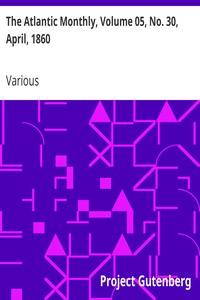Read this ebook for free! No credit card needed, absolutely nothing to pay.
Words: 87675 in 21 pages
This is an ebook sharing website. You can read the uploaded ebooks for free here. No credit cards needed, nothing to pay. If you want to own a digital copy of the ebook, or want to read offline with your favorite ebook-reader, then you can choose to buy and download the ebook.


: The Atlantic Monthly Volume 04 No. 25 November 1859 A Magazine of Literature Art and Politics by Various - American periodicals The Atlantic Monthly
THE ATLANTIC MONTHLY.
A MAGAZINE OF LITERATURE, ART, AND POLITICS.
When Napoleon fell, Foresti was a student at the University of Bologna, whence he returned to his native capital, after obtaining the degree of Doctor of Laws. His earliest forensic labors, like those of our young advocates, were in the defence of accused criminals; and, limited as is this sphere, he must have displayed unusual maturity of judgment and natural eloquence, to have received successively the eminent appointments of Provisory Assistant Judge in the Court of Justice of Ferrara, Supplementary Professor of Eloquence and Belles Lettres in the Lyceum, and Judge of the Peace, by virtue of which latter office he crossed the Po to practise at Polesino,--wisely preferring the Austrian to the Papal jurisdiction. In Crespino, in the province of Rovigo, in the Lombardo-Venetian Kingdom, Foresti was made Praetor under the Emperor's warrant. Coincident with this recognition of his judicial knowledge and skill, was a kindred appreciation on the part of his liberal and patriotic countrymen; they beheld in the vigorous and disciplined mind and generous heart of Foresti, in his civic wisdom and courage, the representative and ally they sought in this portion of their beautiful and unhappy land. To disseminate the principles and secure the cooperation of Venice became the special office of the Carbonari leaders of Ferrara, and they had only to reveal the high and holy object they cherished, to one who so well knew the wants and woes of his country as Foresti, to enlist his adventurous sympathy. The delicate and difficult mission, fraught with the dearest prospects of Italy, was nearly consummated, when a treacherous colleague revealed to the accredited agents both of Austria and the Pope the system of this mysterious revolutionary combination in and around Ferrara. The latter shrank from extreme measures, and was content with an oath of retraction; but the Austrian government gave instant orders to the chiefs of police, both there and at Venice, to arrest those whom the perjured Count Villa named as adherents of Carbonarism. The decree was executed with military force; and, without warning, preparation, or even a parting interview with their families and friends, the suspected were hurried off to the Piombi, that Venetian prison so graphically described by Pellico. All correspondence and personal intercourse was denied. Meantime, an ingenious and persevering investigation went on, to ascertain the scope of the enterprise thus summarily baffled, the means proposed, and the individuals implicated. To complicate still further the situation of the victims, in other quarters the flame they had secretly fed burst forth conspicuously; Naples and Piedmont were in arms; and Austria conceived an alarming idea of the national spirit she had partially contravened. The rigor of espionage towards the imprisoned and their friends increased; the prosecution was insidiously prolonged; privation and solitude, vigilance and suspense were made instruments for subduing the resolution and invading the confidence of the captives; they pined in desolation, ignorant of their fate, uninformed of the welfare of those most dear to them, without resources of defence or consolation, except what the strength of individual character yields; physically weakened, morally isolated; sometimes roused from sleep and bewildered with questions; at other times told they were to die, that some companion had confessed, or that some loved one had ceased to exist;--and all these crises of feeling and anxiety, of surprise and despair, induced with a fiendish deliberation, to startle honor into self-betrayal, wring from exhausted Nature what conscious rectitude would not divulge, or agonize human love into inadvertent disloyalty.
At length their fate was decided. Foresti's companion in prison was the son of a judge of Ferrara; and, one November midnight, their conversation was interrupted by the unexpected entrance of the jailer, who bade Foresti follow him. The hour and the manner of the official convinced both him and his comrade that his sacrifice was resolved upon; they embraced, and he left the cell to find himself strictly guarded by six soldiers. This nocturnal procession marched silently through the vast, lonely, and magnificent rooms of the Ducal Palace to the door which leads to the Bridge of Sighs: it was the old road to destruction,--the mysterious process, made familiar by novelists and poets, by which the ancient and sinister republic made more fearful the vengeance of government. As the unfortunate youth passed through a labyrinth of gloomy corridors, he recognized the haunts of the ancient Inquisition; the atmosphere was clogged with damp; moisture dripped from the stones. A dungeon, lighted only by a lamp suspended from the vault, and narrow, humid, and unfurnished, except with a pile of straw and a rude table, proved the dreary goal of their heavy steps. Left to his own reflections, Foresti contemplated his prospects with deliberate anguish; that he had been found guilty was apparent; if the fact of his direct agency in initiating the oath of self-emancipation, the sacred compact of national self-assertion in the Austrian dominions, had transpired, he felt that his prominence as a judicial officer, and the firmness with which he had refused to explain the purposes or betray the associates of this memorable league, made him the most probable victim of extreme measures, should one be chosen from the Carbonari of Ferrara. At that period of his life he entertained the opinion that suicide was justifiable to avoid an ignominious death at the hands of arbitrary power. Believing his fate sealed, he gave a few moments of tender reminiscence to his dead mother and his living father and sisters, to the dreams of his youth, and the patriotic aspirations to which he was about to fall a sacrifice. The jailer returned, bringing a book and a bottle of wine, for which he had asked; a few tears were shed, a prayer for forgiveness breathed, and then he plunged a knife into his breast; the blade broke; he shattered the bottle at his side and swallowed the fragments, and then fell bleeding and exhausted on the straw. If left long alone, life would have ebbed away; but, probably in anticipation of such a catastrophe, the officer ere many hours revisited the cell to put chains upon the prisoner. Discovering his condition, a surgeon was called, remedies were applied, and two Austrian sentinels carried Foresti into the presence of the judge. It was scarcely dawn; the venerable and courteous, but inflexible representative of the Emperor expressed solicitude and sympathy; a secretary and physician, with the guard and their prisoner, confronted each other by the dim light of two candles. Irritated by the conventional politeness of this arbiter of his destiny at such a crisis, having vainly sought death, and bitterly conscious of the long outrages perpetrated under the name of justice, Foresti burst forth into stern invectives, and boldly declared his liberal sentiments, his allegiance to the principles for the sake of which he thus suffered, and his absolute enmity to the usurpers of his country's freedom. The Cavalier Mazzetti treated this overflow of emotion as the ebullition of a youthful mind, romantic and intrepid, but unreasonable; he professed the sincerest pity for so gifted and brave a youth, lamented his delusion, painted in emphatic words his want of gratitude and allegiance, treated his political creed and organization as chimerical, and wound up by informing Foresti that he was condemned to die on the public square of Venice, and that nothing would save him but a complete revelation of the true plan, arrangements, and members of the secret conclave to which he belonged. Threats and blandishments failed to move the prisoner; he was silent, accepted his doom, and was remanded with two allies,--one of whom purchased a remission by treason to his vows. Such was the climax of two dreary years of imprisonment, aggravated by ingenious moral torture.
This entire ceremony was characteristic of Austrian despotism, aware of the profound sympathy among the Italians for their patriot martyrs, of the widespread disaffection, of the necessity of exciting vague and terrible apprehension,--and at the same time conscious that policy forbade arousing the fury of despair. The accused were thus kept more than two years alternating from hope to desperation, the people in ignorance of the issue, and then, when led out, as they supposed, to die, they served as a warning to those who dared imperial vengeance, while, by a sudden act of apparent clemency, the government at once rid itself of formidable opponents and assumed the character of merciful executors of law! It was rumored that the consideration of his youth saved the life of Foresti;--he was sentenced to twenty years' imprisonment.
These scenes in Venice were reenacted, with unimportant modifications, within a few months, at Rome and Turin, at Modena, Parma, and Naples. The rolls of victims embraced the most highly endowed and heroic men of the day. Many of them, after years of incarceration, distinguished themselves in civil and literary life; some perished miserably in durance; and a few yet survive and enjoy social consideration or European fame. Among them were representatives of every rank, vocation, and section of the land,--noblemen, professors, military officers, advocates, physicians, priests, men of wealth, of genius, and of character. Those known in America, either personally or by their writings, are Count Gonfalonieri of Milan, Silvio Pellico, Castilla, Borsieri, Maroncelli, and Foresti. The abortive revolutions of 1831 and 1848 sent other refugees to our shores, and canonized other saintly heroes in the Calendar of Freedom; but these were the original, and, as a body, the remarkable men, who, imbued with the intelligent and progressive Liberalism of the nineteenth century, practically established in Italy by Napoleon, bravely initiated the vital reaction invoked by humanity as well as patriotism, before which European despotism has never ceased to tremble, and which, however baffled, postponed, and misunderstood, by the law of God as well as the development of man, is absolutely destined to an ultimate triumph.
This observation was sagacious. It was by calm resolution and philosophic self-possession, through faith in the ultimate triumph of justice and freedom, that Foresti kept at bay the corrosive despair which irritated less noble characters into melancholy or wasted spirits of gentler mould to insanity. Yet his physical torture was extreme. Of robust frame and in the plenitude of youthful vigor when arrested, the want of food during the earlier years of his captivity made serious and permanent inroads upon a naturally powerful constitution. We have heard him relate, with a humorous emphasis indicative of brave endurance, yet suggestive of the keenest pangs, how eagerly he one day seized a pudding, thrust under his dress, as he passed the lodge of an official in the court, by a compassionate woman,--how ingeniously he concealed it from the sentinels, at the risk of burning his hands,--with what triumph he unfolded and with what voracity he devoured it in the solitude of his cell. Sometimes an indignity overcame his self-possession, as, on one occasion, when the jailer's attendant rudely awoke him with a kick, as he deposited a basin of hot broth, which Foresti indignantly seized and dashed its scalding contents into the face of the brutal menial, who thenceforward was more respectful in his salutations. But it was the moral suffering against which all his wisdom and courage were invoked to struggle,--the resolute maintenance of healthful mental activity, without an object or motive underived from will,--the repression of hopeless, vague, self-tormenting reverie, which perverts intellect and drains moral energy,--the habitual exercise of memory, reflection, and fancy, to preserve their functions unimpaired. Such expedients were of special necessity at Spielberg; for never were educated men so barbarously deprived of the legitimate resources of mind and heart; thought and love were left uninvited, unappeased. Sir Walter Raleigh had the materials, at the Tower, to write a history; Lafayette, at Olmutz, lived in perpetual expectancy of release; Moore and Byron, children, flowers, birds, and the Muses cheered Leigh Hunt's year of durance: but in this bleak fortress, innocent and magnanimous men beheld the seasons come and go, night succeed day, and year follow year, with no cognizance of kindred or the world's doings,--no works of bard or sage,--no element of life,--but a grim, cold, deadly routine within stone walls,--all tender sympathies, the very breath of the soul, denied,--all influx of knowledge, the food of the mind, prohibited, experience a blank, existence a void!
"To such sad pitch their gathering griefs were wrought, Life seemed not life, save when convulsed by thought."
How much had occurred while these years of arbitrarily imposed monasticism crept heavily by, to excite the speculative thought and kindle the sympathies of educated men! To what new aspects of civilization and fresh phases of contemporaneous history their liberation suddenly introduced them!
Their journey from Brunn to Gradisca was a perfect contrast to that melancholy transit, so many years before, from Venice to Spielberg. It was near the beginning of April, 1836, when they started in carriages with a commissary and a few guards; in every town and village through which they passed, crowds surrounded them with gratulations; the inns where they stopped were besieged with well-wishers; Nature, too, seemed to hail their release with vernal beauty; and so they journeyed on, to be received as honored guests rather than prisoners-of-state at the Castle of Gradisca. Their sojourn here was as recreative as was consistent with that degree of supervision necessary to prevent escape; they were at liberty to walk about, to make and receive visits, to bathe in the sea, to attend the fairs, and examine the local celebrities of Friuli; a single commissary often accompanied their excursions, and personally the most delicate consideration was paid them. Here, too, the most affecting reunions of long-severed kindred and friends took place; their relatives hastened hither to embrace them.
Foresti used to relate many anecdotes illustrative of the sympathy and respect felt and manifested by strangers during this interlude between prison and exile. One deserves record here. Two travelling-carriages arrived at a village-inn, one evening, where they were resting. While the gentlemen were inspecting the apartments, a lady of distinguished appearance inquired of a bystander, who the strangers were towards whom so many friendly glances were directed; soon after, the landlord bore to them her request for an interview; they rose at her entrance; she attempted to speak, but her voice faltered, and, with tears, she turned to her little boys and said, "Kneel, my darlings, to these brave Italian patriots; they are illustrious victims in the great cause of Liberty; and you, gentlemen, bless my sons; your blessing will be fruitful to them of good; it will make them love their country and die for it, if need be. I am a Pole. My country is oppressed like yours. I have two brothers compromised in the last insurrection in Cracow. May God preserve them!"--and weeping bitterly, she retired. They afterwards learned that her husband was Counsellor of State to the King of Prussia.
On the 1st of August, 1836, they were transported by night to Trieste, and, by a singular coincidence, placed on board the same brig-of-war whence Kozsta was subsequently taken at Smyrna,--an incident memorable in our subsequent diplomacy, as having occasioned the celebrated letter of Webster to the Austrian envoy. Provided by that government with warm clothing, the money they had taken to Spielberg was restored to them, not, however, in the original gold coin, but in the Vienna bills for which it had been then exchanged by the police, diminished nearly two-thirds in value during the interval of fourteen years. The vessel was uncomfortably crowded; the voyage occupied three months; but they fared alike with the officers. Towards the close of October, they beheld the noble bay of New York; and so intense was the satisfaction with which they first trod American soil, the goal and terminus of such protracted suffering, that, ever after, the Battery, where they landed, was hallowed to their memories as consecrated ground.
Free books android app tbrJar TBR JAR Read Free books online gutenberg
More posts by @FreeBooks


: The Atlantic Monthly Volume 05 No. 29 March 1860 A Magazine of Literature Art and Politics by Various - American periodicals The Atlantic Monthly






